Struggling with no-shows or having clients reschedule last minute?
Salon cancellation policies are one of the most important things you can implement in your salon because they’ll protect you.
Salon staff will also have a clear idea of what to do when no-shows or reschedules inevitably happen.
Your Salon’s General Policies
There are several other policies you should have in place at your salon in addition to your cancellation policy:
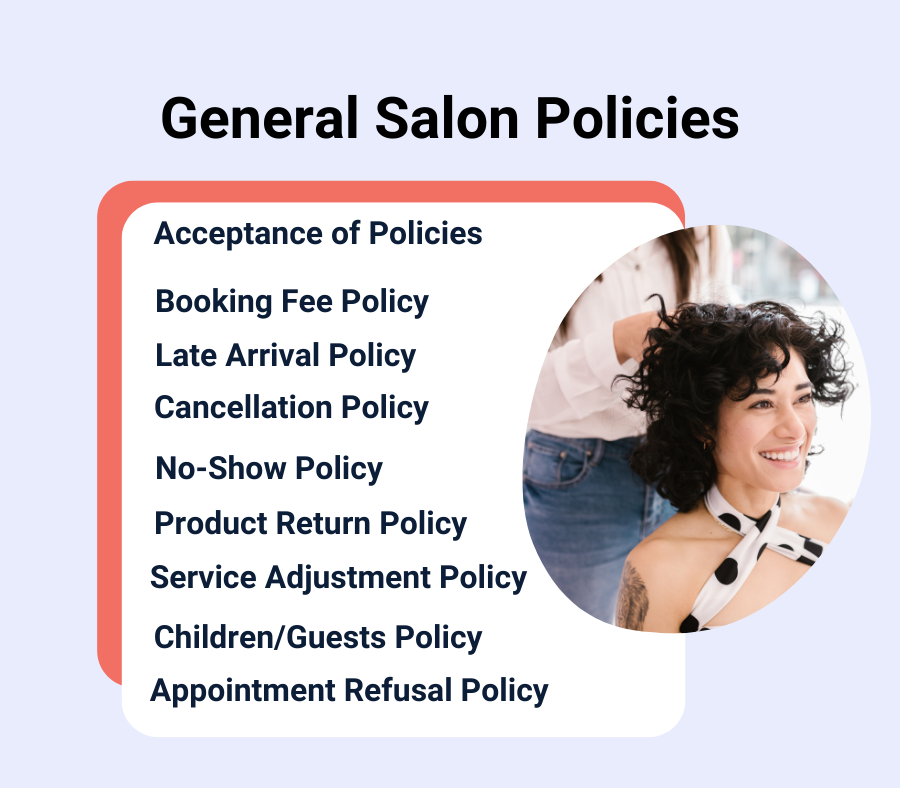
- Acceptance of Policies. This policy means that clients agree to all of your salon’s policies when booking appointments.
- Booking Fee (Deposit) Policy. Many salons choose to require deposits in order to protect against no-shows or for color services requiring more than three hours. If this is something you’d like to do, you should have a booking fee policy in place. Some salons will specify that deposits are only transferable to one appointment in the event of a reschedule; rescheduling multiple times, meanwhile, will result in a lost deposit. Don’t forget to have a plan for how booking fees will be refunded in the event of a cancellation.
- Late Arrival Policy. While most salons will offer a grace period of ten minutes or so, lateness beyond this will typically result in a late fee or even a missed appointment if you fail to notify the salon.
- Cancellation Policy. Standard salon cancellation policies require that clients must cancel appointments at least 24 to 48 hours in advance. Less than 24 hours usually results in a flat fee or a percentage of the booked service amount.
- No-Show Policy. No-shows are typically charged at 100% of the booked service amount. Some salons will also require clients to make deposits when booking their next appointment. After a certain number of no-shows, clients may no longer be able to book at all.
- Product Return Policy. If you sell products, it’s a good idea to have a product return policy in place. Typically this means that clients will have 14 days to return products as long as they haven’t been opened. Some salons also offer a product exchange policy; in this case, clients typically have 30 days to exchange products.
- Service Adjustment / Guarantee / Service Re-Do Policy. This is a correction policy – a policy put in place in the event that clients require some sort of correction to their service. Typically salons will agree to make adjustments within a certain period of time (often two weeks).
- Children / Additional Guests Policy. Some salons also have policies around children and additional guests – that is, children and guests must not be present unless they are being serviced.
- Appointment Refusal / Zero Tolerance Policy. For health and safety reasons (like COVID), if you feel you won’t be able to meet a client’s expectations after a consultation (read our consultation tips!) or in the event of non-inclusive behaviour, some salons choose to put an appointment refusal policy in place.
Other Policies You Might Want to Consider:
- Liability Policy. In the event of skin complications due to allergic reactions, some salons have a liability policy in place.
- Use of Image. If you plan to post pictures of your clients on social media, it’s a good idea to have a use of image policy in place.
- Shipping Policy. This policy outlines how many business days are required to ship products (typically two) and the process when products are out of stock.
- Valuables Policy. In the event of stains due to the chemicals used for processing hair or even for lost items, some salons choose to not take responsibility by putting a valuables policy in place.
Why Are Salon Cancellation Policies Important? Why Have a Cancellation & No-Show Policy?
At the end of the day, salon policies protect you from things like liability and lateness. They’re also important because they clearly outline your processes so staff understands what to do whenever they encounter various situations.
Salon cancellation policies are particularly important because they establish your expectations (and consequences). Ultimately, a cancellation policy helps to reduce no-shows because clients understand they’ll be charged a fee if they don’t cancel in time. When it does inevitably happen, you’ll be able to charge per your cancellation policy and still get paid.
If you’re a commission-based stylist, a cancellation policy is especially important because you’re being paid for your time!
Consider this: one no-show appointment per day at $100 would be $25,000 a year in lost revenue.
Read More: Salon Price Increase Notice: How to Inform Clients? (Templates)
Examples of Salon Cancellation Policies
The 24-Hour Policy
The universal (and easiest) salon cancellation policy is the 24-hour (or 48-hour) cancellation policy. This policy requires clients to cancel within a given timeframe; if they don’t, they’ll be charged a fee.
In order for this policy to work, you’ll need to obtain the client’s credit card information when booking an appointment, either over the phone, in person or via salon software. Salon software also allows you to store all of this information in each client’s profile so you always have their cards on file.
The Tiered Policy
The tiered policy is similar to the 24-hour policy except it allows for more flexibility. For example, the notice time will depend on the type of service the client booked.
Because this policy is more complex, it’s important to make sure it’s as simple as possible. An easy way to do this is to only mention the specific services that require a different notice time.
What Should Your Cancellation Policy Include? A Guide to Creating an Effective Cancellation Policy
While your salon cancellation policy should always be tailored to your unique business, every cancellation policy should include the following:
- A Reasonable Timeframe for Clients to Cancel. First and foremost, your cancellation policy should provide clients with a reasonable amount of time in which they can cancel appointments. Typically this is 24 hours, but some salons also do 48 hours. If you’re unsure about what sort of timeframe you should provide, consider how long it takes to fill an open slot.
- The Penalty. Your cancellation policy should also indicate what charges clients will incur. Many salons choose to charge a flat fee cancellation fee while some charge a percentage of the booked service amount. No-shows, meanwhile, are typically treated as a no-show and charged at 100% of the booked service amount. Generally speaking, you should charge whatever you’re comfortable with while also having the penalty be high enough to protect yourself.
Some salons require deposits after a no-show appointment. You’ll also have to decide how to charge these fees; while you can have clients pay in person in advance, the easiest way is to use salon software to save cards on file when booking appointments.


- How to Cancel. Your clients should also understand how to cancel. Do you only accept cancellations by phone or do you also allow clients to cancel via text, email or social media direct messages?
- Clear, Concise and Firm Wording. While you’ll still want to be friendly, it’s also a good idea to avoid wording that could suggest the cancellation policy is optional. Examples include “We ask” or a sentence like the following: “Any cancellation less than 24 hours in advance may result in a fee upon rebooking.”
How to Inform Clients of Your Cancellation Policy
- Mention it When Clients Book Appointments. When you accept appointments over the phone, verbally tell clients over the phone about your cancellation policy. (You’ll also want to have a copy on your website, etc. – more on this below).
- Link Your Cancellation Policy to the Online Booking Process. If you offer online booking via salon software, you can include a note during the online booking process or even link your cancellation policy form to your services and require clients to sign off on your policy. The policy is then automatically saved in the client’s file.
Have clients sign off on your cancellation policy when booking online!
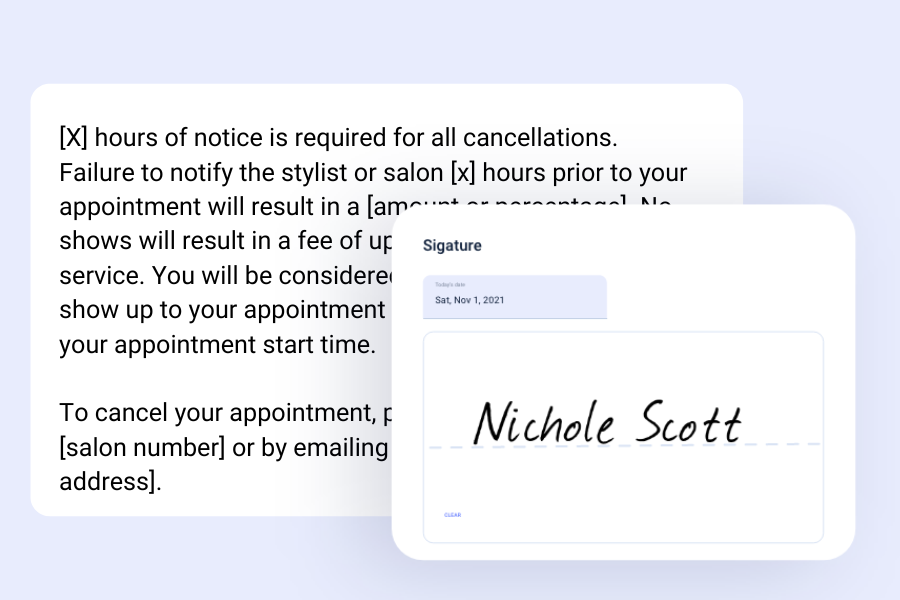

- Include Your Policy on Your Website. It’s also a good idea to include your cancellation policy on your website in case clients forget what you told them over the phone.
- Include Your Policy in Your Voicemail Message. Consider adding your cancellation policy to your voicemail message as well. For instance, “If you’re calling to reschedule or cancel your appointment, please note we require X-hours notice. You can find more information on our website at [insert name of website].”
- Post Your Policy on Social Media. You can also share your cancellation policy across your social media pages.
Exceptions to the Rule
While you’ll always want to take your salon policies seriously, there will likely be cases where there will be exceptions to the rule. Here are some examples:
- Inclement Weather. Of course you’ll want to avoid endangering your clients’ lives, so this is when many salon owners and stylists relax their rules.
- For Loyal Clients. For loyal clients who never cancel, you may want to consider relaxing your policy in the event of a last-minute cancellation.
Salon Cancellation Policy Samples: How to Write a Salon Cancellation Policy
General Salon Cancellation Policy Template
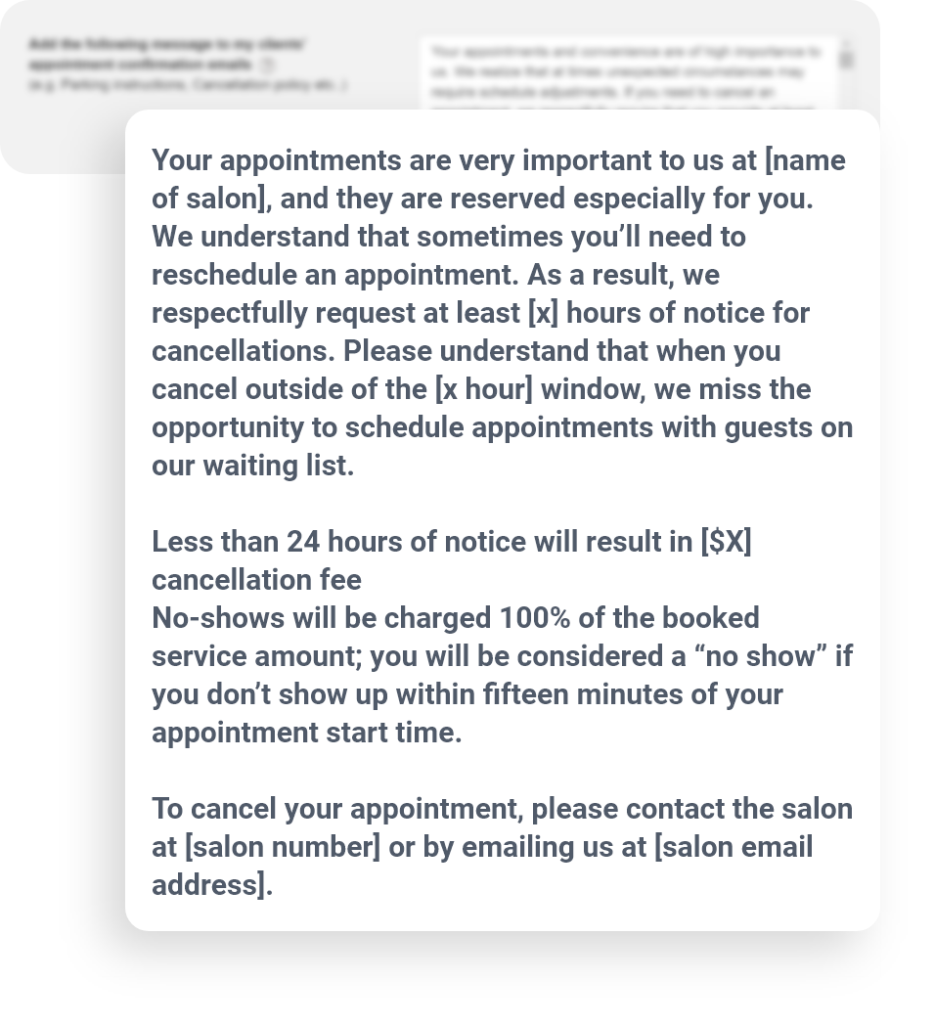

Strict Salon Cancellation Policy Template
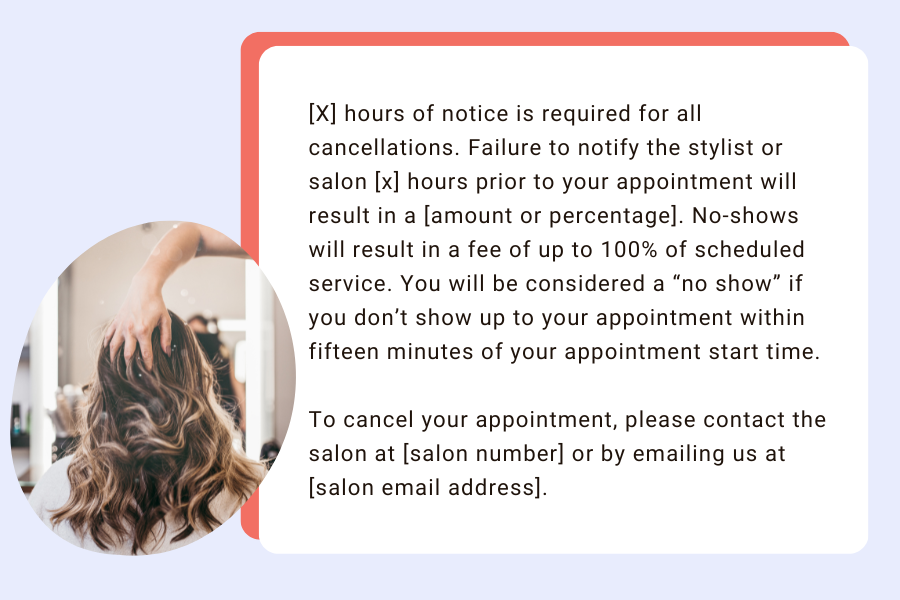

Short Cancellation Policy Template
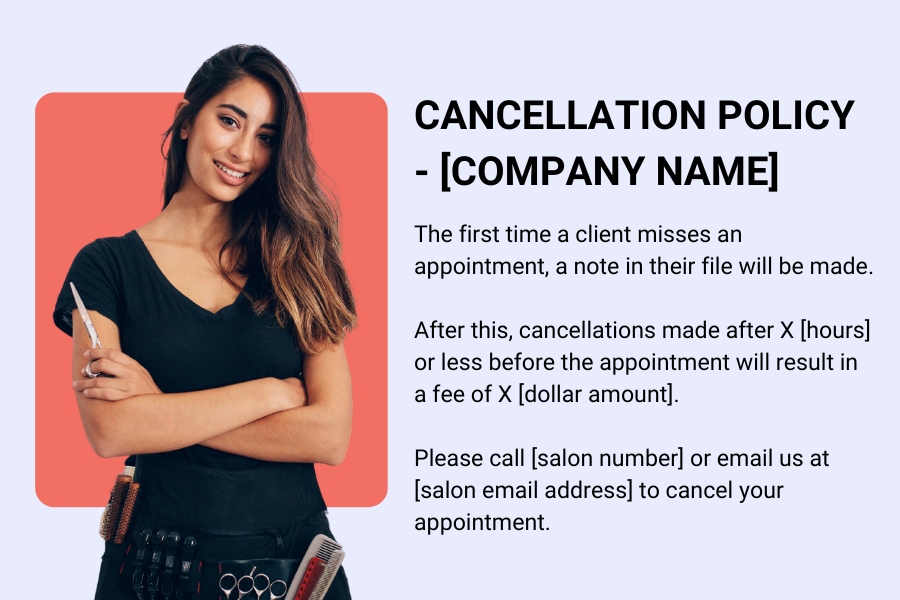

How to Effectively Execute Your Cancellation Policy
Once you have your cancellation policy, how do you actually execute it so that it’s successful?
- Get Ahead of Cancellations with Appointment Reminders. Use salon software to send appointment confirmations and reminders by text and email – completely automatically! You can even share your cancellation policy in your reminder emails.
Send professional, automatic appointment reminders!


- Consider Giving Clients a Warning First. Perhaps you might want to consider giving clients a warning first and instead make a note of a last-minute cancellation or no-show before charging them first. Fun Fact: Did you know you can track late, cancelled and no-show appointments in Yocale?
![]()
![]()
- Save Cards on File. Use salon software to save cards on file (or even accept deposits) during the online booking process. This way, you’ll be able to easily charge clients in the event of a cancellation or no-show.
Wrapping it Up
Salon cancellation policies are super important when it comes to protecting your time. They also help make you look professional, too, considering that most salons have cancellation policies in place today.
Other Blog Posts You Might Be Interested In:
- Salon Price Increase Notice: How to Confidently Raise Your Prices
- Hair Consultation Tips to Ensure Your Clients Return
- 9 Salon Customer Service Tips to Create a 5-Star Salon
Interested in learning more about salon online booking and scheduling software? Book a demo with a Yocale product specialist today.




